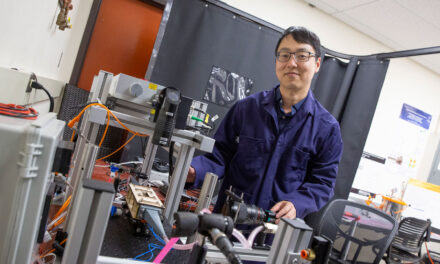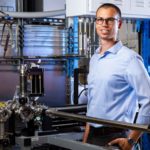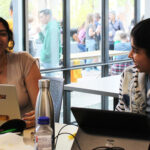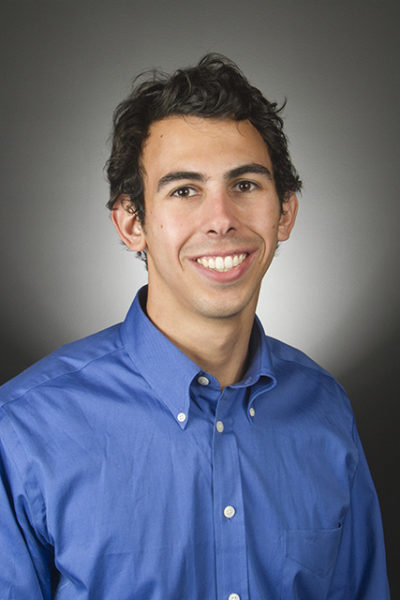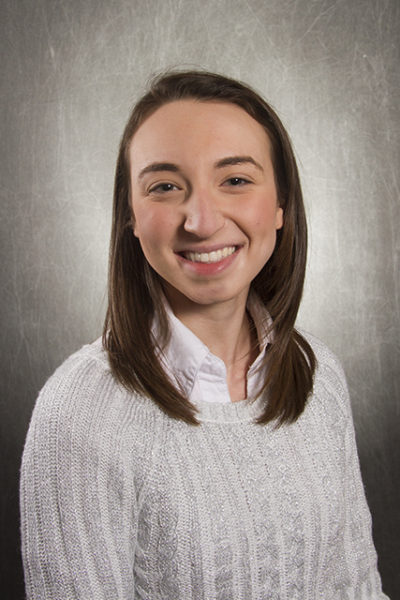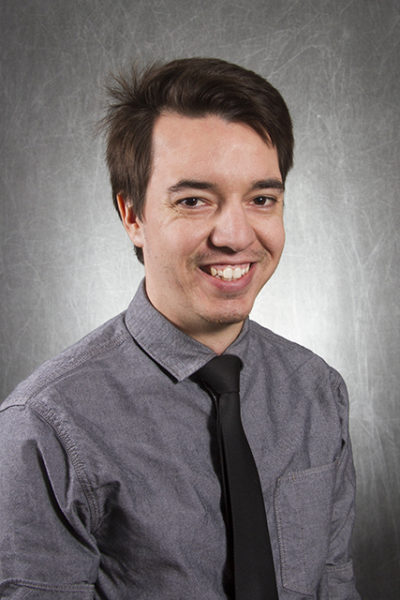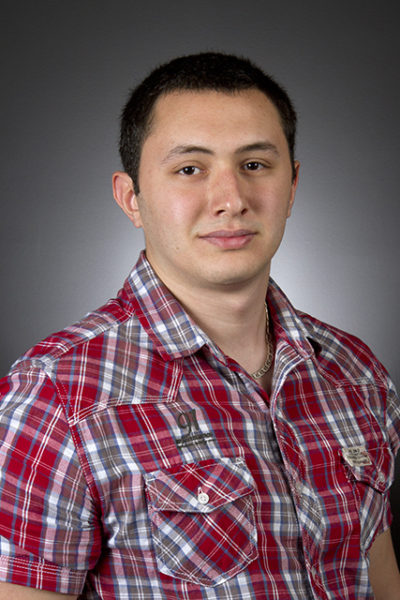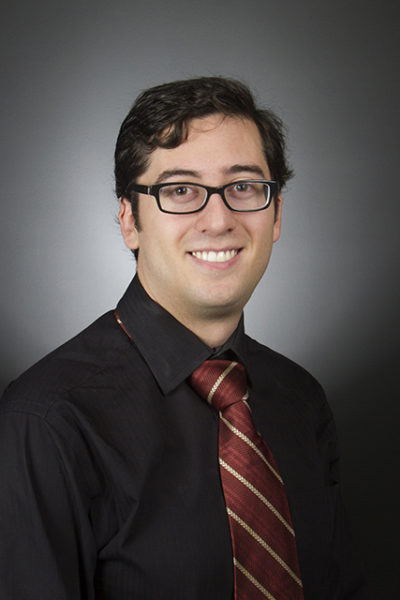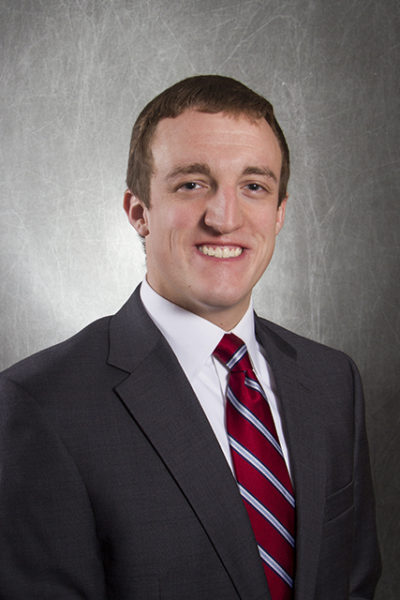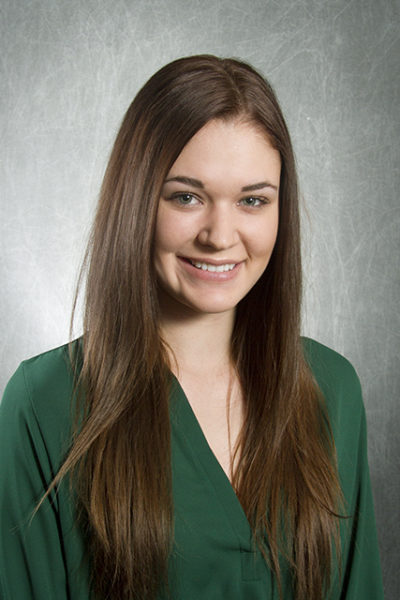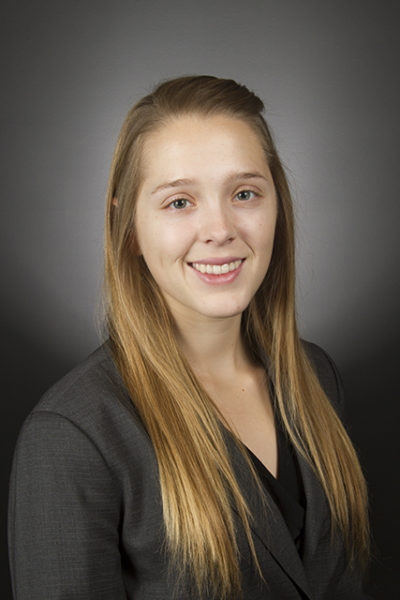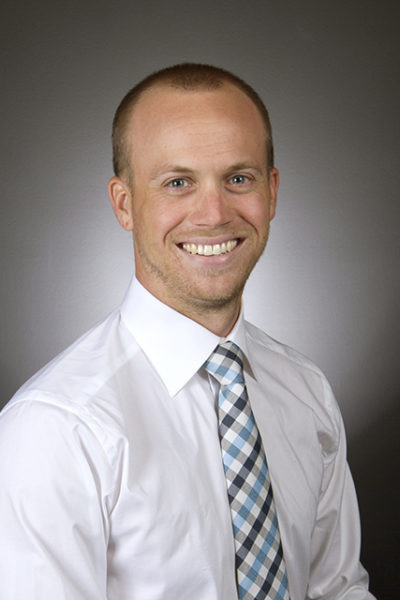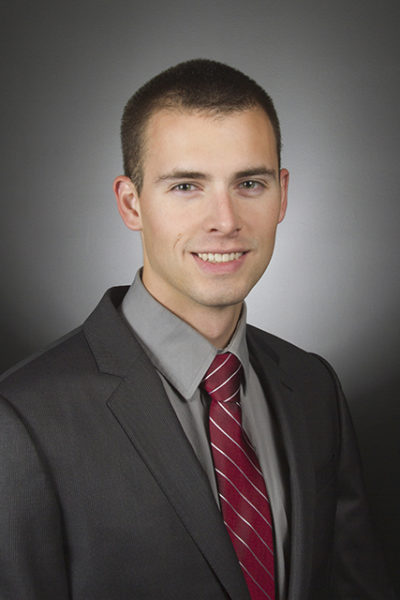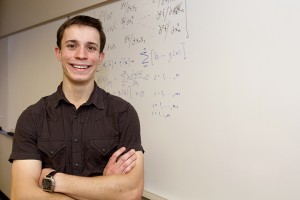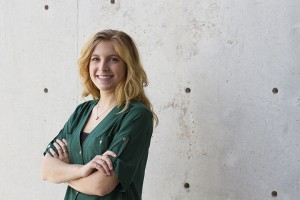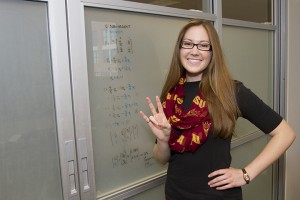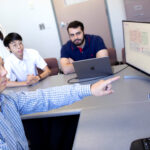
Fall 2013 Outstanding and Distinguished ASU Engineering Graduates
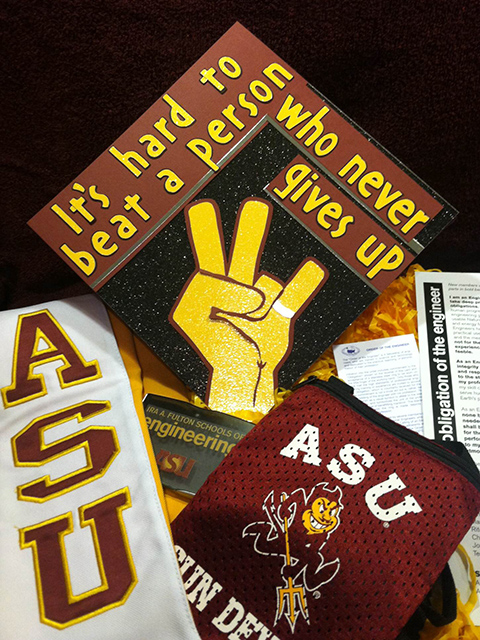
Top grads are standouts in academics, research, community service and leadership roles
Arizona State University’s Ira A. Fulton Schools of Engineering bestows special recognition on a number of top-performing undergraduate engineering students receiving their bachelor’s degrees at the fall and spring semester commencements.
Students are selected by faculty members as Outstanding Graduates in recognition of the their academic performance. In addition, others are selected as Distinguished Graduates for exemplary accomplishments and contributions beyond their academic studies.
The achievements of the honored graduates include maintaining high grade point averages in their classes, excelling in research and student engineering competitions, and demonstrating leadership through student organizations and community service projects.
Many have also broadened their experience through internships with engineering companies, study abroad programs, serving as teaching assistants, and mentoring and tutoring fellow university students.
Some have contributed as ambassadors of ASU and the Fulton Schools of Engineering through aiding recruitment and K-12 education outreach efforts.
The students selected for these honors for the 2013 fall semester are:
Nicholas Berk, Outstanding Graduate in computer systems engineering
Nicholas Berk says he decided on his college major based on presentations he attended while on tours of a couple of East Coast Ivy League universities he considered attending. The graduate of Chandler High School prepared to begin studies at Duke University before he had a realization.
“I got as far as Welcome Day [at Duke], when I realized ASU offered as many opportunities, if not more,” he says. “I knew ASU would focus more on helping me get the most out of my undergraduate years, and I knew that a lot of other places don’t always have that same mindset.”
He adds, “I found that what I thought about the undergrad opportunities here to be absolutely true.”
Berk did his part to make the most of those diverse opportunities.
He earned a 4.0 grade point average while enrolled in ASU’s Barrett, The Honors College. He’ll be the featured student speaker at Barrett’s fall semester convocation ceremony.
He got lab experience through the Fulton Undergraduate Research Initiative – designing and implementing computer hardware and software to explore how robotics technology can be used to teach geometry to elementary and middle school students.
He became a lab management assistant for a Fulton Engineering faculty member.
He organized group study sessions and tutored other ASU students – particularly to help them succeed in some of the tougher computer science and engineering courses.
He honed his communications skills as a member of the Honors Devils, which promotes ASU’s honors college. Berk led campus tours, and wrote and delivered speeches at student recruitment events.
“I learned that if you can’t communicate about something well, it won’t be seen as valuable,” he says. “Communication skills area is the most important for elevating your career.”
The highlights of his undergraduate experience were highly sought-after summer internships at Southwest Airlines and Microsoft that have helped jump-start his career. His performance with Microsoft led to a full-time job with the company that he will start soon after graduation.
The job will push back the timeline a little on his goal to broaden his expertise by earning a law degree.
“I want to go into patent law. My degree in computer systems engineering will be a good fit for that because it gives you good technical background for that area of law,” he says.
Berk says these kinds of varied skill sets should prepare him to achieve a long-term goal “to make a major contribution to a high-tech company.” Maybe a company that he will start himself, he adds.
Nicole Dunham, Outstanding Graduate in industrial engineering
Nicole Dunham, a graduate of Hamilton High School in Chandler, Ariz., never considered any other choice of major but engineering.
“Math and science has always been my thing, and my father was a computer science engineer,” she says. “He kind of gave me a push” toward the profession.
In high school she did research on the various branches of engineering, coming to the conclusion that “I liked the organizational and efficiency of engineering, and making processes work.”
As a student in ASU’s Barrett, The Honors College, she thrived as an industrial engineering major. Her affinity for organization challenges reflected itself in leadership roles she took on, including vice president and later president of the ASU chapter of the Society of Women Engineers and vice president of the Institute of Industrial Engineers chapter.
Dunham also served on the board of directors for ASU’s annual Engineering Open House as director for volunteer recruitment for the event. She was also logistics specialist for the Engineering Student Council.
In addition, she worked as a teaching assistant for Fulton Engineering’s growing online industrial engineering program, and three seasons as a skybox concierge during football games at ASU Sun Devil Stadium.
The management and logistical experience served her well in a year-and-a-half internship with U.S. Airways. There she worked on a project to improve orientation and training for newly hired employees. Another project involved development of an optimization program to provide the most efficient schedule for maintenance of aircraft components. The project became the basis for her honors thesis.
Amid the time-consuming endeavors outside the classroom, Dunham maintained a perfect 4.0 grade point average while putting herself in a position to earn a bachelor’s and a master’s degree in just four years.
She’ll finish studies for the graduate degree in the spring and then begin work with Honeywell Aerospace.
Outside of her engineering talents, Dunham is a skilled golfer. She golfed competitively in high school. Her college years left much less time to keep up her game, but she is “still good enough to be competitive” with her father and his friends, she says.
Andrew Fasnacht, Outstanding Graduate in informatics
Andrew Fasnacht was born in a hospital on Luke Air Force Base in Glendale, Ariz., where both of his parents were serving in the U.S. Air Force. He has lived all but a year in Arizona and when he received the prestigious ASU President’s Scholarship to attend any of Arizona’s state universities, he says ASU was the obvious choice.
The Moon Valley High School graduate at first chose computer science as his major, but switched to informatics for what he saw as opportunities in the field to be more creative.
“I really enjoyed the creative possibility of writing computer code and watching programs spring to life after a few important keystrokes,” says Fasnacht, whose studies focused video game informatics.
One of the most rewarding and, at the same time, challenging experiences for Fasnacht was working on his senior-year capstone design project. He helped direct his project team through the development stages of a website designed to help faculty in the School of Computer, Informatics, and Decision Systems Engineering to efficiently review and manage applications for student teaching assistants.
“There was an automated element as well, so we came up with an algorithm that could look at students’ applications and automatically make the best student-course matches possible,” he explains.
Fasnacht says the teamwork and leadership aspects of the project helped him to grow as an individual and provided valuable experience that will translate into effectiveness in a real-world workplace.
Among other notable achievements, was his recovery from a particularly difficult first semester at ASU, resulting in a grade point average of only 2.77. Despite the early setback, Fasnacht now is track to graduate with cum laude (“with praise”) honors.
Fasnacht says he is considering eventually pursuing a graduate degree in the future, but for now he is seeking employment in the video game development industry in the United States and Canada.
“My relatively realistic dream job has always been working at Pixar, creating beloved, high-quality, animated films,” he says.
He would like to contribute to advances that “blur the lines between interactive games and passive cinematic movies,” and is also interested in finding work in the sports industry, perhaps in a sports game development studio.
Fasnacht calls soccer “the love of his life.” He volunteers to help manage minor league soccer matches as well as sporting events such as Ironman marathon competitions.
In his free time, Fasnacht also manages a blog dedicated to his appreciation of movie cinematography.
Abbas Jaber, Outstanding Graduate in mechanical engineering
Although born in Toledo, Ohio, Jaber spent most of his life in Lebanon, his family’s native country, before returning to to the United States to be close to family members here and pursue his college education.
He looked at schools in several states, but says “the Ira A. Fulton Schools of Engineering stood out because it seemed to be continually growing and it offered a lot of opportunities for students.”
Jaber says his engineering passion lies in the power industry, leading him to pursue mechanical engineering. “I hope to be a part of the new energy revolution, contributing to making power generation clean, cheap and sustainable for everyone,” he says.
He says he’s gotten a well-rounded experience at ASU. “It combined undergraduate research with a lot of off-campus opportunities to explore engineering fields,” he says.
Jaber, who will graduate with a 4.0 grade point average, got three semesters of laboratory experience through the Fulton Undergraduate Research Initiative. He built a thermal conductivity measurement platform for thin films and bulk materials utilizing a technique known as “3-Omega,” with the goal of investigating potential thermoelectric materials for waste-heat recovery.
Building upon that research will be the focus of his continued studies to earn a master’s degree in mechanical engineering. He is on schedule to complete work for the degree in a year as part of the engineering schools’ 4-plus-1 accelerated studies program.
Jaber got job experience through three off-campus engineering internships.
He worked at the National Institute for Standards and Technology near Washington, D.C., developing inputs for the Fire Dynamics Simulator, a power engine that enables simulations of fire dynamics in various scenarios.
In Tempe, he was an intern for Nth Degree Technologies and Arizona Public Service Co. At Nth Degree Technologies in Tempe he characterized new photovoltaic cells.
For Arizona Public Service Co. he investigated the feasibility of converting a coal-fired boiler in a power plant to a dual coal and natural gas configuration, a project that involved both engineering and economics analysis. He has a second internship with APS lined up for next summer.
“My engineering education extends far beyond the classroom, which is why I’m very satisfied with experience at ASU,” he says.
Jaber’s academic record earned him two scholarships to support his college education – the Peter Stein Measurement Engineering Scholarship and The W.L. Gore 4+1 Applied Project Scholarship.
“I am so thankful for Dr. Peter Stein and the folks over at Gore for these generous awards,” he says. “Because of these scholarships, I was able to focus more on my academic work and research without the need to find part-time jobs.”
When not immersed in engineering studies, Jaber spends time watching European soccer – particularly his favorite team, Futbol Club Barcelona – and on weekends he is often hiking and exploring new places.
Skyler Jackson, Outstanding Graduate in chemical engineering
Jackson says pursuing an engineering degree was an obvious choice for him because while growing up he liked to spend hours researching, designing and programming everything from cars to automated robots.
He says he chose ASU because of the reputation of engineering programs. Home-schooled in Prescott, Ariz., his favorite subject was chemistry, so he chose to major in chemical engineering.
While a student in ASU’s Barrett, The Honors College, Jackson maintained a 3.95 grade point average. He also secured several research positions including four semesters of work in the laboratory through the Fulton Undergraduate Research Initiative (FURI).
He got additional research experience during two summers at National Renewable Energy Laboratory in Golden, Colo., working on processing techniques for the implementation of new materials into organic solar cells, including the implementation of a new technique that modifies layers of organic solar cells in an attempt to replace expensive metals and increase efficiency.
In his FURI research he focused on the oxidation of methylene blue industrial dye utilizing concentrated sunlight and titanium oxide nanoparticle catalyst. He determined how to reproduce a process that eliminates methylene blue contaminants in water using a concentrated solar dish, with the broader goal of determining how to effectively remove polluting dyes from wastewater used in textile production.
Jackson was also involved in many extracurricular pursuits. He was vice president and later president of the ASU chapter of the American Institute of Chemical Engineers (AIChE), in which he led more than 100 members in professional development efforts.
Jackson says helping his peers was “the most rewarding thing about being a chemical engineering major.” In addition to his roles in AIChE, he sought out the opportunity to be a teaching assistant and an academic tutor. He worked as a paid tutor at ASU’s Disability Resource Center.
He says he plans to continue teaching and learning in the hope of becoming a professor of chemical engineering. With that goal in mind, Jackson is applying to several chemical engineering doctoral programs. He plans to do work in the organic photovoltaics field, with the goal of helping to make solar energy more economical.
Beyond his engineering skills, Jackson is an experienced violinist – he began playing the instrument at age three. During his undergrad years, he played in the ASU student orchestra and a string quartet.
Ian Jacobson, Outstanding Graduate in electrical engineering
Ian Jacobson says he came to ASU to experience something different from the environment of the Texas farm-life he had known for the first 18 years of his life.
He grew up in the town of Mesquite on a 15-acre farm where he spent time with friends and took care of his horses.
A Hispanic Merit Scholarship helped enable him to come to ASU.
“I went into engineering because my grandpa inspired me to,” Jacobson says. “He was a chemical engineer who designed some of the very first rockets.“
Contrary to most students, who decide to pursue a degree that matches interests they developed in high school, Jacobson says he chose electrical engineering because it was one of the subjects that he knew the least about.
“I’ve always loved challenges and there’s nothing more rewarding than learning something you didn’t know before,” he says. “It’s all about that feeling you get at the end of every semester when you realized you know more than you did last time.”
Jacobson demonstrated his leadership potential in taking on the mentorship role for his senior-year engineering design project team after one of the team’s first mentors dropped out of the project.
The position challenged him to learn about electrical circuit board design in only two weeks to help the team achieve its goal. Jacobson and his teammates succeeded in creating an effective radiation pulse detector.
In addition to excelling academically as a student in ASU’s Barrett, The Honors College, Jacobson will graduate with magna cum laude honors.
During his undergrad years, Jacobson helped lead the Campus Crusade for Christ group. As part of that effort, he started a community service project to not only feed the homeless, but to have participants in the project sit down and eat with the homeless people they were helping to feed.
“Obviously, everyone wants food, but the homeless in particular just want someone to sit down with them and have a normal conversation,” he says.
After graduation Jacobson will begin a full-time job in Tucson as a manufacturing and test engineer with Raytheon, a defense and aerospace company. He also plans to return to school to earn a master’s degree in business administration in a few years to further build his leadership skills.
In addition to optimizing virtual manufacturing lines and wiring together cell phone interfaces, Jacobson likes to ride horses and swing dance with friends on weekends.
“All in all, the most rewarding thing about my experience at ASU has been the great friends I developed over the years,” Jacobson says.
Kelly Jesionowski, Outstanding Graduate in computer science
Kelly Jesionowski says her decision to major in computer science was “a leap of faith” based on the advice of her father, an electrical engineer.
It turned out to be a leap in the right direction for the National Merit Scholar and graduate of University High School in Tucson, Ariz. She earned a 4.0 grade point average at ASU and made the Fulton Engineering Dean’s List each semester.
Jesionowski developed her computer science skills rapidly enough to land a summer job for IBM in 2011 after completing her sophomore year. Her work there led the company to keep her employed the following two summers, as well as part-time during the school year.
The job provided the biggest challenge of her undergraduate years – working up to 20 hours a week while completing her upper-level studies.
“That was the hardest thing, balancing work and school,” she says. “But the IBM job was a great learning experience, especially learning how to be part of a project development team.”
Another team endeavor she counts as a valuable accomplishment was her senior-year engineering design capstone project. The team created a website for cadets in the Air Force Reserve Officers’ Training Corps program at ASU.
“It’s cool that something we built from scratch is going live and will really help students at ASU,” she says.
The project experiences has helped her win a job in San Diego with BAE Systems, a global company that develops advanced defense, security and aerospace technology systems.
Jesionowski says she wants to advance her mastery of the technical aspects of the computer science field in the next few years, but she already has some long-term plans.
She’s considering future pursuit of a master’s degree, and wants to eventually move up to higher-level professional positions.
“I definitely see myself moving out of purely technical roles into leadership roles,” she says. And beyond that goal, Jesionowski is intent on joining or initiating efforts to encourage more women to go into her chosen field.
The predominance of males in computer science “can make you feel that as a woman you have to prove yourself more,” she says. “I’d like to help break down the stereotypes and barriers that might be keeping women from getting into this field.”
Besides her proficiency in computer science, Jesionowski counts Ping Pong among her skills – especially for one particular achievement.
“We have a Ping Pong table at our house and my three brothers play all the time,” she says, and at one time or another she has won against each of them.
Krista Mika, Outstanding Graduate in civil, environmental and sustainable engineering
Krista Mika’s appreciation for British culture factored into her decision to enroll at ASU.
“I remember wanting to go to school in England since I was a little girl, and ASU has a good study-abroad program,” says the graduate of Mountain View High School in Mesa and winner of an ASU President’s Scholarship.
Interests in “architecture and really tall buildings” combined with “being really good at math” led her to civil engineering.
By the spring semester of her sophomore year Mika was studying in England at Leeds University, known for having one of the leading civil engineering programs in Europe.
She says adapting to the demanding academic system at Leeds “taught me how to study more efficiently.”
She credits that experience for helping her develop the discipline to maintain a 4.0 grade point average as student in ASU’s Barrett, The Honors College, and to complete undergraduate studies a semester early.
To support her education, Mika received an ASU Reach for the Stars Fellowship, for which students must be nominated by their school or college within the university, demonstrate academic excellence and be in a group underrepresented in their field.
Through the Fulton Engineering Schools’ 4-plus-1 accelerated studies program, Mika plans to earn her master’s degree in structural engineering in the next year.
Even with an intense academic schedule, she has managed to pursue opportunities and interests outside the classroom.
Mika is the current president of ASU’s student chapter of Chi Epsilon, National Civil Engineering Honor Society. She is co-design captain for ASU’s Steel Bridge team, which participates in regional and national competitions sponsored by the American Society of Civil Engineers.
For her honors thesis, she evaluated student performance in a structural analysis and design course, helping a faculty member devise methods to improve the teaching of the course and to help students improve their performance.
Outside of engineering-related activities, Mika was a member of the ASU’s Sun Devil Marching Band for three years, playing the baritone horn, and she began competing in triathlons as “a relaxing way to unwind,” from stress of her studies.
After graduate school, her goal is to put her skills to use to help achieve big things — literally very big. She has her sights set on joining an international company that designs grand-scale structures.
Her ultimate aspiration is to contribute to innovative achievements such as rotating skyscrapers and similarly groundbreaking engineering endeavors.
“I want to be a part of building projects that are going to be historic,” Mika says, “things that are very monumental and iconic.”
Myles Morton, Outstanding Graduate in construction management
Morton grew up shredding papers on job sites where his father’s Phoenix-based construction company was working, so moving up in the field with a degree in construction management had long been on his mind.
But after graduating from Brophy Preparatory School in Phoenix, Morton gave mechanical engineering at the University of Arizona a try. Still, his upbringing in the construction business took hold and he transferred to ASU at age 23 as a construction management major.
That ASU’s Del E. Webb School of Construction encouraged students to get industry experience during their undergraduate years was a major draw for Morton.
He first began developing his skills outside of the classroom during his sophomore year, when he joined the ASU student chapter of the Associated General Contractors (AGC) as well as the ASU team that participated in the organization’s major annual student construction management competition in Reno, Nev.
He credits two seniors on his Reno team for taking him under their wings and mentoring him in a way that would eventually lead him to become the president of the ASU chapter of Sigma Lambda Chi International Construction Honor Society, and the captain of a Reno team during his senior year.
In 2012, Morton was a competitor in the Design‐Build Institute of America’s national student competition. His team won first place in the Southwest region.
As president of the Sigma Lamda Chi chapter he focused on developing industry connections for students and coordinating opportunities for upper-class construction management students to tutor younger students.
He also helped to raise funds to provide the construction hardhats that each ASU construction management graduate wears at graduation ceremonies.
Through his leadership roles, Morton began to make industry connections that led to internships and then a full-time job.
The summer before his junior year, a professor help Morton land an internship at Whiting-Turner Contracting Co. during which he worked on a hospital renovation in Baltimore, Md.
He says the accomplishment he’s most proud of during his time at ASU is being hired as a project engineer with the Okland construction company. He’s working with a group of ASU construction students and alumni on a new building that will house facilities for ASU’s Del E. Webb School of Construction and the School of Sustainable Engineering and the Built Environment—in other words, he’s helping to build a school for the next generation of students.
“It’s a once in a lifetime opportunity to work on a project as personal as this,” he says.
Morton will begin a full-time job with Okland Construction in January. He is planning to eventually pursue a master’s degree in business administration to strengthen skills he will need to achieve a long-term career goal of becoming an executive-level project manager.
When not on a construction project site or in a classroom, Morton likes to rock climb and embark on long rides on his “adventure-touring motorcycle,” what he calls “a cross between a street motorcycle and a dirt bike.”
He will graduate with a 4.0 grade point average.
Ryan Olehausen, Outstanding Graduate in aerospace engineering
Ryan Olehausen excelled not only in his studies but also in Reserve Officers Training Corps (ROTC) programs at ASU. He started with a year in the Air Force ROTC and then three years in the Navy ROTC, where he rose through the ranks to hold every major leadership role in his battalion.
The graduate of Mesquite High School in Gilbert, Ariz., earned an ROTC scholarship and the ASU President’s Scholarship to support his education. Majoring in aerospace engineering with a concentration in aeronautics, he achieved a 4.0 grade point average and made the Dean’s List each semester.
Olehausen’s exceptional performance academically and in the ROTC earned him membership in Scabbard and Blade, the national ROTC honor society.
He says his experiences in military training and his responsibilities commanding his unit were at once the most rewarding and most challenging aspects of his undergraduate years.
His father spent more than 20 years in the military. His mother served for 10 years. His older sister, also an ASU graduate, is now an Air Force officer. He will be following their path. After graduation Olehausen begins a year of training for an assignment as a submarine officer and nuclear propulsion officer, with a role as a nuclear reactor operator aboard one of the Navy’s nuclear-powered submarines.
His aspirations, however, go beyond a military career. “I see myself in the Navy for a while, but I want to be more well-rounded,” he says. He intends to learn other languages and is thinking about eventually pursuing a degree in nuclear engineering.
He’s also considering future studies for a degree in ethics, philosophy or a related area. “I think you should learn to look at the big picture, to see life through perspectives on the world beyond your own,” he says.
With studies and ROTC consuming most of his time at ASU, Olehausen says one of his most significant accomplishments during his undergrad years is that “I did have a social life, and I made what I think will turn out to be some long-term friendships.”
Outside of the classroom and Navy officer training, Olehausen has been a member of the ASU sailing team for the past year, participating with the squad in major regional sailing competitions and pursuing certifications through the American Sailing Association. He has also been a competitive rock climber and is an avid runner who recently began competing in marathons.
Garrett Austin, Distinguished Graduate
Garrett Austin earned a perfect 4.0 grade point average as a student in ASU’s Barrett, The Honors College.
An ASU President’s Scholarship recipient, he got into the 4-plus-1 accelerated program that will enable him to earn his bachelor’s and master’s degree in industrial engineering in four years.
In May he will begin a job with a well-established international company.
Austin says he’s happy with his personal accomplishments, “but I feel my time at ASU has been most successful because I ‘ve been able to help other people.”
Austin mentored other engineering students and did outreach to local high schools to promote interest in engineering careers. He served as a teaching assistant in industrial engineering classes.
He mentored students at the E2 Camp freshmen engineering student orientation and through the Fulton Engineering Schools’ campus residential life program.
The graduate of Desert Vista High School in Ahwatukee took over the presidency of the ASU student chapter of the Institute of Industrial Engineers at a time when it was close to becoming inactive. In only about a year, the organization’s revitalization under his leadership was impressive enough to win the institute’s Gold Award, the top honor for high-achieving chapters.
Austin helped raise funds for a local Relay for Life event – a fundraiser for the American Cancer Society – and a donation drive for United Blood Services. He also helped organize a 5K run to benefit Hospice of the Valley.
He will be the featured student speaker at the fall semester’s Fulton Schools of Engineering graduation ceremony.
Austin wants to someday mentor fellow professionals, after getting several years of experience in the engineering workplace. He’ll start his career with the medical products division of W.L. Gore & Associates — a job he earned by his performance in internships with the company over the past two summers.
As part of a class project he worked in partnership with Jabil Circuit Inc., a provider of services for electronic manufacturing, to improve production of one of the company’s product lines.
For his honors thesis he worked with an ASU industrial engineering professor in collaboration with Mayo Clinic on methods to optimize patient service by increasing efficiency in hospital emergency department operations.
Beyond his proficiency in industrial engineering, Austin says he’s become a skilled rock climber and an avid hiker during his undergrad years.
With his Fulton Engineering Distinguished Graduate award he has at least climbed to the same height as his sister Rachel, an ASU biomedical engineering graduate who won the honor two years ago.
Elizabeth Barnes, Distinguished Graduate
In her early high school years Elizabeth Barnes was certain she wanted to be a marine biologist — until her father strongly suggested she take an introductory engineering class.
Not long after that she was contacting people at ASU to find out about the university’s engineering programs and tour the research labs.
“I found out about civil engineering and environmental engineering, and I liked how it’s so related to people’s everyday lives,” Barnes says. “It’s varied and it’s about big-picture stuff. I like that.”
The graduate of Red Mountain High School in Mesa won an ASU President’s Scholarship and performed well enough to be accepted into the 4-plus-1 accelerated academic program, which will enable her to complete studies for a master’s degree next year – within a year of getting her bachelor’s degree. She finished studies for her bachelor’s degree in three and a half years.
Her academic standing during her undergrad years earned her membership in Chi Epsilon, the national Civil Engineering Honors Society. But many of Barnes’ achievements have come through efforts outside the classroom.
She has been a teaching assistant and a member of the Fulton Ambassadors, which promotes Fulton Engineering, as well as an ambassador for the School of Sustainable Engineering and the Built Environment.
She served for three years on the committee that plans E2 Camp, the orientation experience for incoming ASU freshmen engineering students. She also was a student mentor for E2 Camp for three years.
She is managing the website for the upcoming International Symposium on Sustainable Systems and Technologies conference in California, and will participate in the event.
This past summer, Barnes did roadway design as an intern for the Phoenix office of Parson Brinckerhoff, a global company specializing in engineering, design, construction operation and maintenance of infrastructure projects.
She hopes to eventually work for an engineering company that offers opportunities to help the world’s cities find “innovative, creative” and sustainable ways to manage use of energy and water resources, build new infrastructure and contain urban sprawl.
Barnes also wants to boost her profession by using her public speaking skills. She competed in speech and debate in high school and honed her techniques further at ASU as a teaching assistant and an engineering school’s ambassador.
“Engineers need to be more effective public speakers” so that their contributions to society’s advances can be more widely understood and appreciated, she says.
Of all her service activities during her undergrad years, Barnes counts her time as an E2 Camp mentor to younger female engineering students as the more rewarding.
“They know there are so fewer women in engineering than men, so they look up to you as a role model,” she says. “It’s great to be able to encourage them, to tell them they can do this, they can be engineers.”
Brittney Reyman, Distinguished Graduate
Reyman says her path to an engineering career began at four years old when she wanted to be an astronaut “because I loved outer space.”
She later learned about who built and fixed the space vehicles for the astronauts: engineers. “So then that was what I decided to be,” she recalls.
Thus the graduate of Red Mountain High School in Mesa enrolled years later at ASU as an aerospace engineering major, but soon discovered an affinity for organizing, managing and improving projects and processes. She made the switch to industrial engineering, opening up opportunities to pursue her interests within and outside class work.
She mentored others students in her areas of study, as well as mentoring incoming engineering freshmen for the E2 Camp orientation program.
She joined ASU’s chapter of the Institute of Industrial Engineers and served as treasurer for the Society of Hispanic Professional Engineers chapter.
As president of the Fulton Ambassadors, the paraprofessional organization that helps promote and recruit for Fulton Engineering, she oversaw a successful campaign to develop its marketing, branding, fundraising, management, organizational structure and volunteer training.
“I set some pretty lofty goals for myself but all of them were achieved,” she says. “It’s rewarding for me to be leaving behind something the university can now depend upon, an organization that can contribute to ASU’s future.”
The work led to her nomination for the Outstanding Student Organization Leader of the Year. Reyman was also the inaugural winner of the Fulton Engineering’s Paul Hale Mentorship Award.
Reyman applied her industrial engineering education to two summer internships. She worked with Jabil Circuit Inc. on the international company’s printed circuit board production operations. She later worked for IM Flash, a semiconductor manufacturing company that produces advanced memory technology.
Her performance with IM Flash earned her a full-time job with the company that she will begin soon after graduation.
Reyman has put her skills to work in the areas outside the engineering realm. She was a member of the drum line for the ASU Sun Devils Marching Band for three years, and a section leader for two of those years. She has aided efforts to raise public awareness of the needs of people affected by multiple sclerosis.
She has been volunteering as an event organizer for a growing Big Band-era swing dancing scene in the Phoenix metro area. She took up swing “just for fun,” she says. “It gets my mind off math and science for a while. It keeps me in shape and makes me be social.”
Plans for her future include returning to college to earn a master’s degree in a few years, and taking on bigger and bigger leadership roles in her profession.
Reyman’s ultimate goal is to “leave a legacy” through her leadership, she explains. “I want to be in a position where what I do can inspire other people and help them along their own career paths.”
Written by Joe Kullman and Rosie Gochnour
Media Contact:
Joe Kullman, [email protected]
(480) 965-8122
Ira A. Fulton Schools of Engineering



